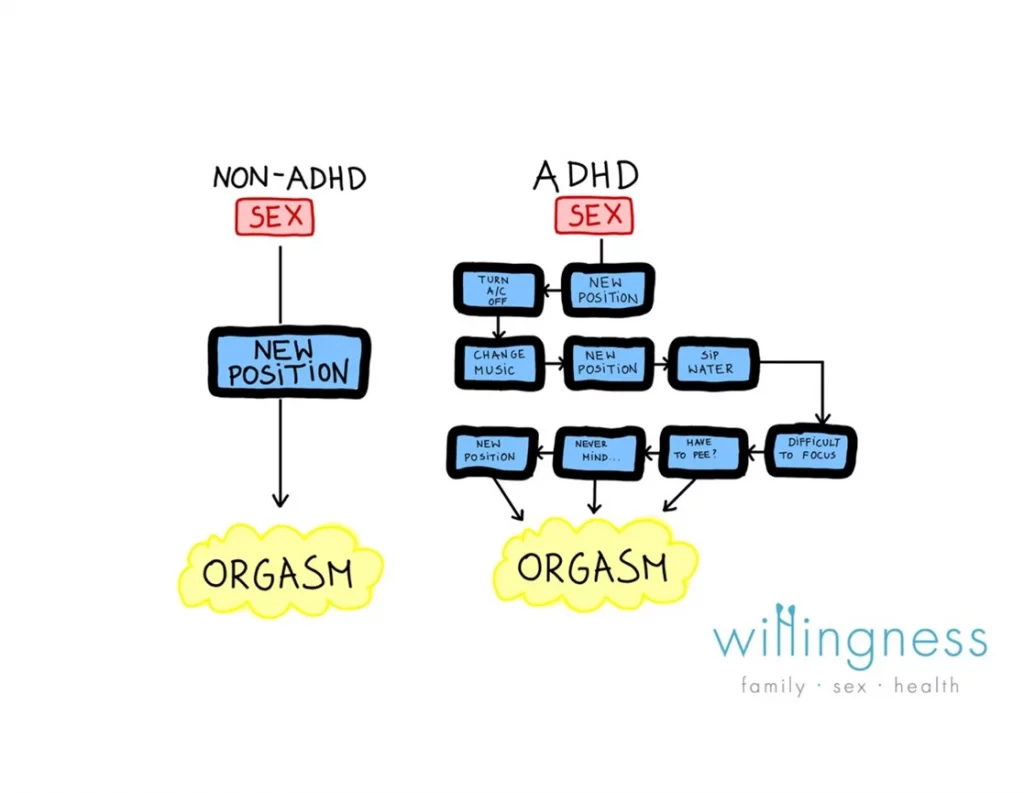Navigating love and intimacy can be a challenge for anyone, but for individuals with ADHD, maintaining a thriving love life often comes with unique hurdles. From struggles with focus and emotional regulation to heightened sensitivity and impulsivity, ADHD can significantly impact relationships and sexual experiences. However, understanding these challenges and learning effective strategies can transform obstacles into opportunities for deeper connection and fulfillment. In this article, we explore the intricate connection between ADHD and sex, offering practical tips to enhance intimacy and build stronger, more passionate relationships.
Understanding the Impact of ADHD on Relationships and Intimacy
ADHD affects various aspects of life, including relationships and intimacy, often in ways that can be challenging for both partners. The symptoms of ADHD, such as impulsivity, difficulty sustaining attention, and emotional dysregulation, can create obstacles to maintaining a healthy and fulfilling love life. Understanding how ADHD influences these dynamics is the first step toward fostering stronger connections.
For many couples, the impact of ADHD and sex is felt in different ways. One partner may struggle with hyperfocus in the early stages of a relationship, showering their significant other with attention, only to find that maintaining this focus becomes difficult over time. This shift can leave the other partner feeling neglected or confused. Additionally, impulsive behaviors might lead to miscommunication or mismatched expectations in the bedroom.
Emotional regulation also plays a significant role. Individuals with ADHD may experience heightened emotions, leading to intense arguments or difficulties in resolving conflicts, which can strain the bond between partners. These challenges can carry over into the intimate aspects of a relationship, creating barriers to trust and vulnerability.
Despite these difficulties, understanding the nuances of ADHD and sex can pave the way for better communication and mutual support. When both partners recognize how ADHD affects their relationship, they can work together to address specific issues, improve intimacy, and create a thriving love life.
ADHD and Sex: Common Challenges Couples Face
When ADHD enters a relationship, it often brings unique challenges that can impact intimacy and connection. These difficulties stem from the way ADHD affects communication, emotional regulation, and focus, all of which play significant roles in a healthy sexual relationship. Understanding these common challenges can help couples address them more effectively and strengthen their bond.
1. Difficulty Maintaining Focus During Intimacy
One of the most common challenges in ADHD and sex is difficulty maintaining focus during intimate moments. Distractions, racing thoughts, or hyperactivity can pull the ADHD partner’s attention away, making it hard for both partners to feel fully present. This lack of focus can lead to frustration, misunderstandings, or feelings of inadequacy.
2. Emotional Sensitivity and Misinterpretation
Individuals with ADHD often experience heightened emotional sensitivity, which can make them more prone to feeling criticized or rejected, even during casual interactions. This sensitivity can amplify misunderstandings during intimate moments, causing one or both partners to feel emotionally disconnected or defensive.
3. Impulsivity Leading to Misaligned Expectations
Impulsivity, a hallmark of ADHD, can influence sexual behaviors and expectations. For instance, an ADHD partner might initiate intimacy at inappropriate times or in ways that feel abrupt to their partner. This mismatch can create tension and lead to feelings of misalignment or rejection.
4. Variability in Sex Drive
ADHD often comes with fluctuations in energy levels, emotional states, and focus, all of which can impact sex drive. At times, the ADHD partner may exhibit a heightened libido, while at other times, they may seem uninterested or distracted. This inconsistency can be confusing for the other partner, who might struggle to understand or adapt to the changing dynamic.
5. Struggles with Communication
Clear and open communication is essential in any relationship, but ADHD can make this particularly difficult. Forgetfulness, difficulty processing emotions, or interruptions during conversations can create barriers to expressing needs and desires in the bedroom. Without effective communication, misunderstandings can escalate and intimacy can suffer.
6. Challenges with Emotional Regulation
Emotional regulation issues associated with ADHD can lead to mood swings or heightened frustration. This can make it hard for couples to navigate conflicts or emotionally charged situations, which often spill over into their intimate lives.
Finding Solutions
While these challenges can be difficult, understanding the link between ADHD and sex is the first step toward finding solutions. Strategies like setting aside distraction-free time for intimacy, practicing patience, and seeking professional support through counseling or therapy can help couples navigate these challenges together. By addressing these issues proactively, couples can create a more fulfilling and connected love life despite the obstacles ADHD may present.

The Role of Emotional Regulation in a Thriving Love Life
Emotional regulation is a cornerstone of any healthy relationship, but for individuals with ADHD, managing emotions can be particularly challenging. The difficulties in regulating emotions often spill over into various aspects of a relationship, including communication, conflict resolution, and intimacy. Understanding the importance of emotional regulation and learning strategies to improve it can transform challenges into opportunities for deeper connection and a thriving love life.
Emotional Regulation and Its Impact on Relationships
Emotional regulation refers to the ability to manage and respond to emotional experiences in a balanced way. For individuals with ADHD, heightened emotional responses—whether it’s frustration, sadness, or even excitement—can make it hard to maintain stability in interactions. This instability can lead to misunderstandings, arguments, or feelings of disconnection between partners.
In the context of ADHD and sex, emotional regulation plays a crucial role in fostering intimacy. When emotions are not managed effectively, small disagreements can escalate, making it difficult to create the trust and vulnerability necessary for a healthy sexual relationship. For example, impulsive reactions or difficulty calming down after an argument can create a lingering emotional barrier that impacts both partners’ willingness to engage in intimacy.
How Emotional Dysregulation Affects Intimacy
- Heightened Sensitivity to Criticism
Individuals with ADHD often experience a heightened sensitivity to perceived criticism, which can lead to feelings of inadequacy or rejection. This sensitivity can make discussions about intimacy, desires, or unmet needs more challenging, as one partner may feel defensive or hurt. - Mood Swings and Their Ripple Effect
Mood swings are a common symptom of ADHD, and they can disrupt the emotional harmony of a relationship. Frequent shifts in mood can make it difficult for partners to predict each other’s emotional states, creating uncertainty that impacts both emotional and physical closeness. - Difficulty Managing Stress
Stress often amplifies emotional dysregulation, making it harder to address conflicts calmly. High levels of stress can also reduce libido or create an emotional wall, preventing partners from engaging in meaningful intimacy. - Challenges in Rebuilding Emotional Connection After Conflict
After an argument or misunderstanding, emotional regulation is key to rebuilding connection. For individuals with ADHD, difficulty processing emotions may lead to extended periods of withdrawal or unresolved tension, which can impact intimacy and trust in the long term.
ADHD and Sex : Strategies for Better Emotional Regulation
Improving emotional regulation can have a profound impact on ADHD and sex, helping couples foster a deeper bond and overcome intimacy challenges. Here are some strategies to consider:
- Practice Mindfulness: Mindfulness techniques, such as deep breathing or meditation, can help individuals with ADHD manage heightened emotional responses and stay present during moments of intimacy.
- Seek Professional Support: Therapy, especially cognitive-behavioral therapy (CBT), can teach practical tools for managing emotions and improving communication in relationships.
- Communicate Openly: Honest and non-judgmental communication about feelings and needs can help both partners feel understood and reduce the risk of emotional misinterpretation.
- Create a Calm Environment: Reducing stressors in your environment, such as noise or clutter, can help improve focus and emotional stability during moments of intimacy.
- Develop a Repair Strategy: Work with your partner to establish a plan for resolving conflicts and reconnecting emotionally after disagreements.
ADHD and Sex Drive: Navigating Highs and Lows
Sex drive can vary widely among individuals, but when ADHD is in the mix, these variations can feel even more pronounced. ADHD often affects mood, energy levels, and impulse control, which can lead to fluctuations in sexual desire. For couples navigating these highs and lows, understanding how ADHD influences sex drive is key to maintaining a healthy and fulfilling intimate connection.
The Connection Between ADHD and Sex Drive
ADHD affects the brain’s dopamine regulation, which plays a significant role in both attention and pleasure. This connection means that individuals with ADHD may experience extreme swings in their sex drive, ranging from periods of intense desire to times of disinterest. These shifts can be confusing for both partners, especially if they aren’t prepared for the impact ADHD can have on their sexual relationship.
Some people with ADHD report hypersexuality during periods of high energy or hyperfocus, where their sex drive seems almost insatiable. Conversely, during periods of low energy, distraction, or emotional overwhelm, they may feel a noticeable drop in libido. Understanding these patterns can help couples navigate the complexities of ADHD and sex drive.
ADHD and Sex : Challenges Couples May Face
- Mismatched Libido
One common issue in relationships where one partner has ADHD is a mismatch in libido. The ADHD partner’s fluctuating sex drive can leave the other partner feeling confused or rejected when their interest wanes unexpectedly. - Impulsivity and Timing
Impulsivity, a hallmark symptom of ADHD, can lead to poorly timed sexual advances. While the ADHD partner may feel a sudden surge of desire, the other partner might not be in the same mindset, leading to frustration or misunderstandings. - Emotional Connection
A decrease in sex drive often coincides with periods of emotional dysregulation or distraction, making it difficult for the ADHD partner to engage in intimate moments. This can leave the other partner feeling disconnected or unimportant.
Strategies for Navigating Highs and Lows
- Open Communication
Discussing how ADHD affects sex drive openly and honestly can help both partners feel more understood. Setting expectations about these natural fluctuations can reduce feelings of confusion or rejection. - Planning Intimacy
While spontaneity is often ideal in relationships, couples dealing with ADHD may benefit from planning intimate moments. Setting aside distraction-free time for connection can help create a more balanced and predictable dynamic. - Managing Impulsivity
For those experiencing hypersexuality, learning to channel impulses constructively is crucial. This might involve self-awareness exercises or therapy to address impulsive behaviors that impact the relationship. - Focusing on Emotional Intimacy
Building emotional closeness during periods of low libido can strengthen the relationship and help both partners feel connected. Activities like talking, cuddling, or sharing hobbies can foster intimacy without the need for physical engagement. - Seeking Professional Support
If extreme highs and lows in sex drive are causing significant strain in the relationship, seeking guidance from a therapist or counselor with expertise in ADHD can be immensely helpful. They can provide tailored strategies to address these challenges.
Conclusion
ADHD and sex drive are deeply interconnected, with the condition often amplifying the natural ebbs and flows of sexual desire. While these fluctuations can be challenging, understanding their root causes and working together to navigate them can lead to a stronger and more fulfilling relationship. By focusing on communication, emotional intimacy, and mutual support, couples can embrace the highs and weather the lows with confidence and compassion.
Overcoming Distractions: Creating Focused Moments of Intimacy
Distractions are a common challenge in any relationship, but they can be especially pronounced for individuals with ADHD. The difficulty in maintaining focus—whether caused by external stimuli or internal thoughts—can disrupt moments of intimacy and leave both partners feeling disconnected. However, with intentional effort and strategies, couples can overcome these challenges and create meaningful, focused moments of connection.

ADHD and Sex : How ADHD Disrupts Intimacy
ADHD impacts attention and impulse control, making it harder to stay present during intimate moments. External distractions like phones, noise, or unfinished tasks can pull focus, while internal distractions—such as racing thoughts or anxiety—can make it difficult to engage fully. These interruptions can lead to frustration for both partners and diminish the quality of their time together.
In the context of ADHD and sex, distractions can make it difficult to build and maintain the emotional and physical connection necessary for intimacy. The partner with ADHD may feel guilty or frustrated for being unable to focus, while the other partner may interpret this as a lack of interest or engagement.
Strategies to Create Focused Moments of Intimacy
- Eliminate External Distractions
Creating an environment conducive to focus is essential. This might include turning off electronic devices, dimming the lights, or ensuring a quiet and comfortable setting. A distraction-free space can help both partners feel more present and engaged. - Set Aside Dedicated Time
Scheduling time for intimacy can be especially helpful for couples where ADHD is a factor. Knowing there’s a specific time set aside for connection can reduce stress and help both partners mentally prepare to be fully present. - Practice Mindfulness Together
Mindfulness exercises, such as deep breathing or guided meditation, can help individuals with ADHD calm their thoughts and focus on the present moment. Practicing mindfulness together before intimate moments can create a sense of shared presence and connection. - Use Sensory Anchors
Sensory experiences, such as holding hands, maintaining eye contact, or focusing on touch, can help ground the ADHD partner in the moment. These anchors can reduce the pull of distracting thoughts and enhance the connection between partners. - Communicate Openly
If distractions occur during intimate moments, addressing them with compassion rather than frustration is crucial. Open communication about what’s happening can help both partners feel understood and reduce tension. - Focus on Emotional Intimacy
Physical intimacy is closely tied to emotional connection. Spending time together engaging in meaningful conversation or shared activities can strengthen the bond between partners, making it easier to overcome distractions during physical moments. - Seek Professional Support
For couples struggling to manage distractions during intimacy, therapy can be an invaluable resource. A therapist can offer tools and strategies tailored to the unique dynamics of ADHD in the relationship.
ADHD and Sex : Conclusion
Overcoming distractions in intimacy requires patience, understanding, and a willingness to adapt. By creating a focused, supportive environment and employing strategies to stay present, couples can strengthen their bond and experience deeper, more meaningful connections. With effort and communication, distractions no longer need to be a barrier to intimacy but rather an opportunity for growth and understanding.
Do you have any personal experience about ADHD and Sex ?


